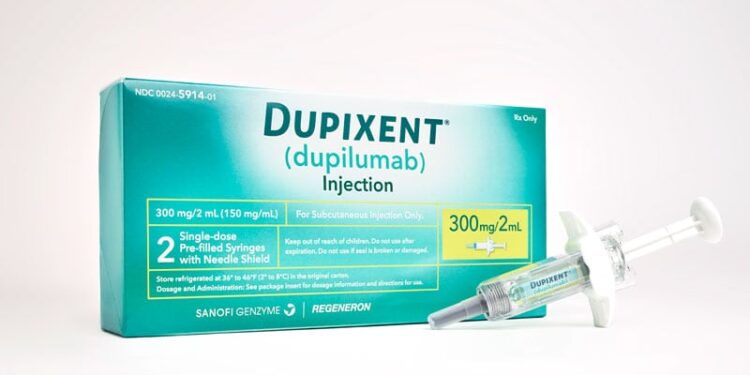TOPLINE:
An analysis of a real-world US practice revealed that a substantial proportion of patients with chronic rhinosinusitis with nasal polyps (CRSwNP) who initiated dupilumab remained adherent at 12 months. Among those who discontinued therapy, over 40% resumed treatment within a short timeframe.
METHODOLOGY:
- Researchers used real-world administrative claims and clinical data to analyze treatment patterns of 3318 patients (mean age, 47.1 years; 54.4% men) with CRSwNP who initiated dupilumab between June 2019 and December 2021.
- Persistence with dupilumab was defined as the interval from treatment initiation to either the end of a 60-day gap without a refill or a switch to another CRSwNP biologic (omalizumab or mepolizumab).
- Patients were considered adherent to dupilumab if they had a medication possession ratio ≥ 0.8 during the 12-month follow-up period.
TAKEAWAY:
- Persistence rates among patients on dupilumab were 84.9% and 69.5% at 6 and 12 months, respectively, with an average follow-up duration of 375.6 days.
- Of 913 patients who discontinued dupilumab, 366 reinitiated the treatment after a median of 1.2 months, with reinitiation probabilities of 35.5% and 43.3% at 6 and 12 months, respectively.
- Treatment adherence was 75.2%, with a high mean medication possession ratio of 1.06.
IN PRACTICE:
“Future studies examining discontinuation reasons and persistence patterns across type 2 comorbidity and AERD [aspirin-exacerbated respiratory disease] subgroups would enhance our understanding of dupilumab use in CRSwNP patients,” the authors of the study wrote.
SOURCE:
Zhixiao Wang, PhD, with Regeneron Pharmaceuticals, Inc., Tarrytown, New York, was the corresponding author of the study, which was published online on August 15 in The Journal of Allergy and Clinical Immunology: Global.
LIMITATIONS:
Reasons for dupilumab discontinuation could not be determined, dispensing for comorbid asthma or atopic dermatitis was not captured, and the 1-year continuous enrollment requirement may have introduced selection bias. In addition, the study findings may not be generalizable to other publicly insured or uninsured patients, and reliance on a subjective gap definition in claims data may have resulted in imprecise records of discontinuation timing.
DISCLOSURES:
The study was funded by Sanofi and Regeneron Pharmaceuticals, Inc. Three authors reported being employees of Regeneron Pharmaceuticals, Inc., and two reported being employees of Sanofi; all five may hold stock or stock options in their respective companies. Three additional authors reported being employees of Analysis Group. One author reported serving on the advisory board and speakers bureau for both Sanofi and Regeneron Pharmaceuticals, Inc.
This article was created using several editorial tools, including AI, as part of the process. Human editors reviewed this content before publication.
Source link : https://www.medscape.com/viewarticle/high-adherence-dupilumab-chronic-rhinosinusitis-2025a1000m4b?src=rss
Author :
Publish date : 2025-08-21 11:32:00
Copyright for syndicated content belongs to the linked Source.

